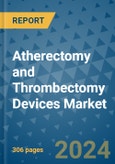Atherectomy and Thrombectomy Devices Market - Report Scope:
The atherectomy and thrombectomy devices market includes a broad range of devices designed for mechanical, rotational, rheolytic, and aspiration-based plaque or clot removal. These devices are widely used in hospitals, specialty clinics, and ambulatory surgical centers to treat arterial blockages and thrombotic disorders. Rising awareness of minimally invasive treatment options, improved procedural safety, and the increasing geriatric population contribute to expanding the market footprint. Moreover, ongoing innovations such as drug-coated devices, image-guided navigation, and compact catheter designs are set to drive adoption among vascular surgeons and interventional cardiologists.Key Market Growth Drivers:
The market is primarily driven by the rising incidence of cardiovascular diseases, including PAD, coronary artery disease (CAD), and ischemic stroke, which create a high demand for effective clot and plaque removal devices. Advancements in catheter design and imaging integration have improved the precision and safety of procedures, increasing adoption rates. The global aging population, which is more prone to vascular blockages, along with favorable reimbursement policies for endovascular procedures in developed regions, further propels demand. Growing healthcare expenditure, coupled with the expansion of specialized vascular care facilities, also supports market growth.Market Restraints:
Despite strong growth prospects, the market faces challenges such as the high cost of advanced atherectomy and thrombectomy devices, which can limit adoption in low- and middle-income countries. Device-related complications, including vessel damage and distal embolization, can hinder procedure acceptance among patients and physicians. Strict regulatory approval processes and prolonged clinical trial timelines can also delay product launches. Additionally, a shortage of skilled interventional specialists in emerging markets may limit procedural penetration, especially in rural areas.Market Opportunities:
Opportunities lie in the development of next-generation atherectomy and thrombectomy devices with enhanced safety features, improved clot capture mechanisms, and real-time imaging integration. Expansion into emerging economies with rising healthcare infrastructure presents significant growth potential for global manufacturers. Collaborations between medical device companies and research institutions can lead to innovative treatment solutions. Moreover, the integration of artificial intelligence (AI) for pre-procedural planning and intraoperative guidance could redefine procedural efficiency and outcomes, opening lucrative opportunities for industry players.Regional Outlook:
North America is expected to dominate the market, driven by high procedural volumes, advanced healthcare infrastructure, and the presence of major medical device companies. The U.S. leads due to strong adoption of minimally invasive vascular treatments and favorable reimbursement systems. Europe follows closely, with countries like Germany, France, and the U.K. witnessing increased investments in endovascular care. The Asia Pacific region is anticipated to show the fastest growth, fueled by rising incidences of vascular diseases, improving access to healthcare, and increasing adoption of advanced medical technologies in China, Japan, and India. Latin America and the Middle East & Africa are gradually expanding due to growing awareness and medical tourism trends.Leading Companies:
Leading companies in the global atherectomy and thrombectomy devices market, such as Medtronic, Boston Scientific, Spectranetics, Bayer AG, Cardiovascular Systems, Argon Medical Devices, Getinge AB, Straub Medical AG, Teleflex, Terumo Medical, and Abbott, are investing heavily in R&D, product innovation, and strategic collaborations. These players focus on enhancing device efficiency, reducing procedural risks, and expanding their product portfolios to cater to both developed and emerging markets.Companies Covered in This Report:
- Medtronic
- Boston Scientific
- Spectranetics
- Bayer AG
- Cardiovascular Systems
- Argon Medical Devices
- Getinge AB
- Straub Medical AG
- Teleflex
- Terumo Medical
- Abbott
Market Segmentation:
By Type:
- Rheolytic
- Aspiration
- Rotational
- Ultrasound Device
By Application:
- Hospitals
- Clinics
- Others
By Region:
- North America
- Latin America
- Europe
- Asia Pacific
- Middle East & Africa
This product will be delivered within 1-3 business days.
Table of Contents
Companies Mentioned
- Medtronic
- Boston Scientific
- Spectranetics
- Bayer AG
- Cardiovascular Systems
- Argon Medical Devices
- Getinge AB
- Straub Medical AG
- Teleflex
- Terumo Medical
- Abbott








